
Joseph Willibald Kellerhoven (27 April 1789, Mannheim - 18 June 1849, Speyer) was a German portrait painter.

Joseph Willibald Kellerhoven (27 April 1789, Mannheim - 18 June 1849, Speyer) was a German portrait painter.
He was the son of Moritz Kellerhoven, court painter for Charles Theodore, Elector of Bavaria and, in 1808, one of the first professors at the expanded Academy of Fine Arts, Munich.
Joseph entered the Academy in 1809 and received practical training in the history painting department. His father was his primary teacher, but he also studied with Joseph Hauber , Andreas Seidl and Johann Georg von Dillis. He exhibited his works for the first time in 1814.
In 1818, he married Friederike Feiler, the daughter of Friedrich Feiler, an official in the Prussian Ministry of War. Shortly after, he moved to Speyer, to accept a position as a drawing teacher at the Royal gymnasium. In 1825, the city opened a trade school, so he left the gymnasium to accept a similar position there, as the salary was higher. Friederike died two years later, aged only twenty-nine. Both of their sons died before reaching adulthood.
After 1839, he worked as an art teacher at the newly-established Catholic school. In 1840, he remarried, to Elisabeth Werner, the daughter of a local landowner. The marriage remained childless.
In 1842, he suffered what was most likely a brain hemorrhage, which left him partially paralyzed and unable to work. Elisabeth cared for him until his death, seven years later.
![]() Media related to Joseph Kellerhoven at Wikimedia Commons
Media related to Joseph Kellerhoven at Wikimedia Commons

Georg Simon Ohm was a German physicist and mathematician. As a school teacher, Ohm began his research with the new electrochemical cell, invented by Italian scientist Alessandro Volta. Using equipment of his own creation, Ohm found that there is a direct proportionality between the potential difference (voltage) applied across a conductor and the resultant electric current. This relation is called Ohm's law, and the ohm, the unit of electrical resistance, is named after him.

Johann Kaspar Zeuss was a German historian and founder of Celtic philology. He is credited with demonstrating that the Celtic languages belong to the Indo-European group.
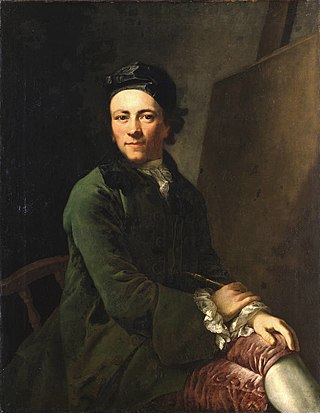
Anton Graff was an eminent Swiss portrait artist. Among his famous subjects were Friedrich Schiller, Christoph Willibald Gluck, Heinrich von Kleist, Frederick the Great, Friederike Sophie Seyler, Johann Gottfried Herder, Gotthold Ephraim Lessing, Moses Mendelssohn and Christian Felix Weiße. His pupils included Emma Körner, Philipp Otto Runge and Karl Ludwig Kaaz.
Joseph (von) Heine was a German physician and a high civil servant in the Bavarian health service in the Rheinkreis.

Johann Georg Schwartze was a painter from the Northern Netherlands who grew up in Philadelphia and was trained in Düsseldorf and the Düsseldorf school. He was a painter of portraits and historical themes and became the father of painter Therese Schwartze and the sculptor Georgine Schwartze.
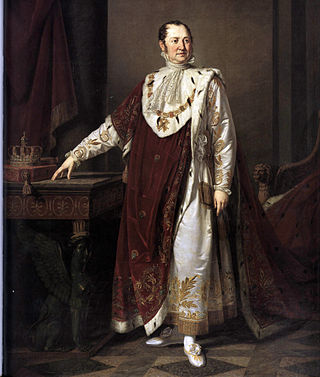
Moritz Kellerhoven was a German portrait painter and etcher.
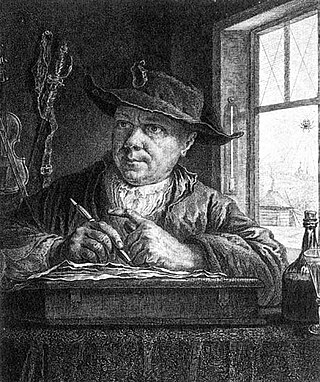
Georg Friedrich Schmidt was a German engraver, etcher and pastel painter, in the Rococo style.

Adolf Schrödter or Adolph Schroedter was a German painter and graphic artist; associated with the Düsseldorf school of painting. He is considered to be one of the pioneers of German comics.
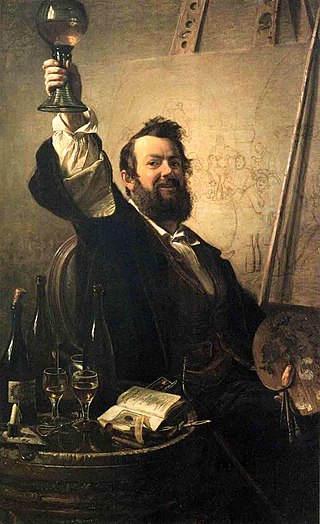
Johann Peter Hasenclever was a German genre painter, associated with the Düsseldorfer Malerschule.
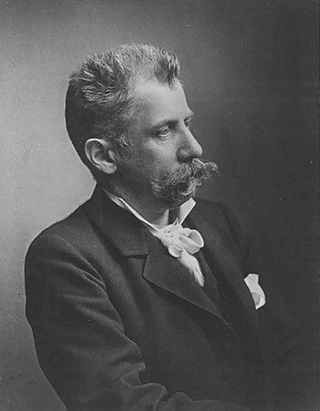
Gabriel von Seidl was a German architect and a representative of the historicist style of architecture.
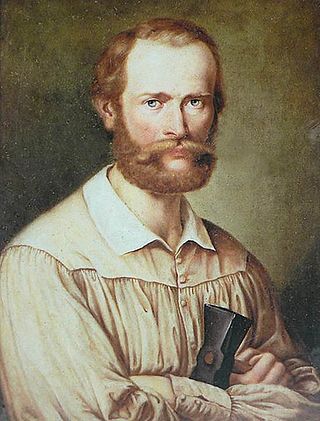
Joseph Ernst von Bandel was a German architect, sculptor and painter. He is best known for his 38 years of work on the monumental Hermannsdenkmal near Detmold, honoring Arminius' victory over Roman troops in 9 AD.

Joseph Anton Rhomberg was an Austrian-born German painter, illustrator and graphic artist.

Georg Friedrich Schlater was a Baltic-German painter, lithographer and drawing teacher.
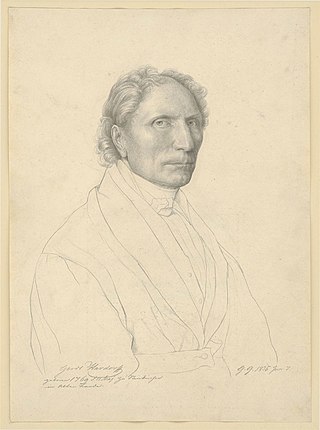
Gerdt Hardorff was a German painter, art collector and drawing teacher. He is sometimes referred to as The Elder to distinguish him from his son, Gerdt, who also became a painter.
Clemens Jöckle was a German art historian. From 2001 to 2012, he was the director of the Städtische Galerie Speyer.
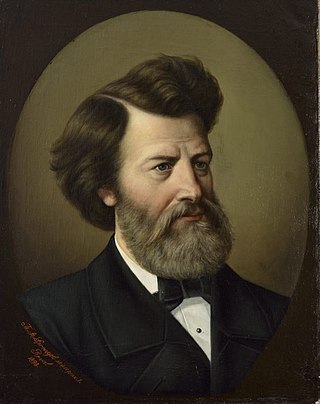
Carl Christoph Wilhelm Theodor Albert Sprengel was a Baltic-German painter, writer and professor, associated with the Düsseldorfer Malerschule. Although most of his works are portraits, he is also known for landscapes and historical scenes.
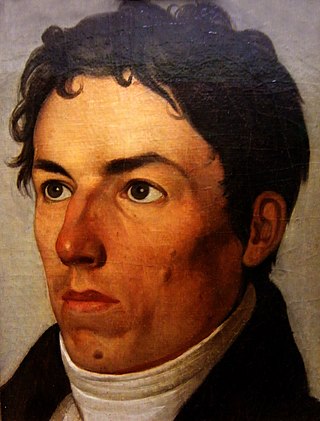
Joseph Wintergerst was a German painter in the Romantic style; associated with the Nazarene movement.
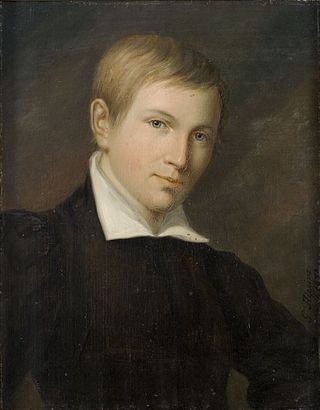
Otto Friedrich Ignatius was a Baltic-German painter, writer, and composer.
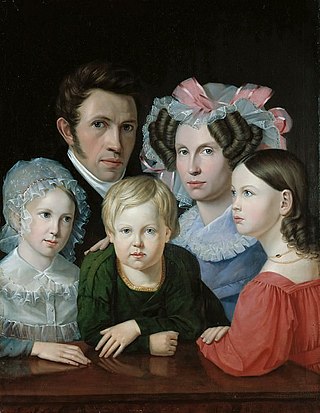
Gustav Adolf Hippius was a Baltic-German portrait painter and lithographer.
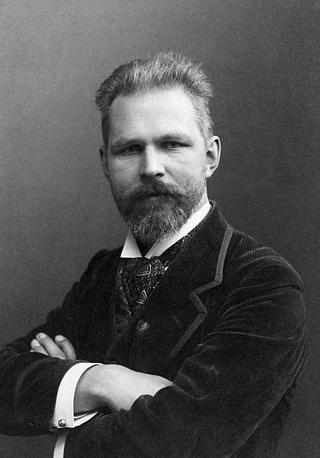
August Ludwig Georg Meyn was a German portrait and genre painter.